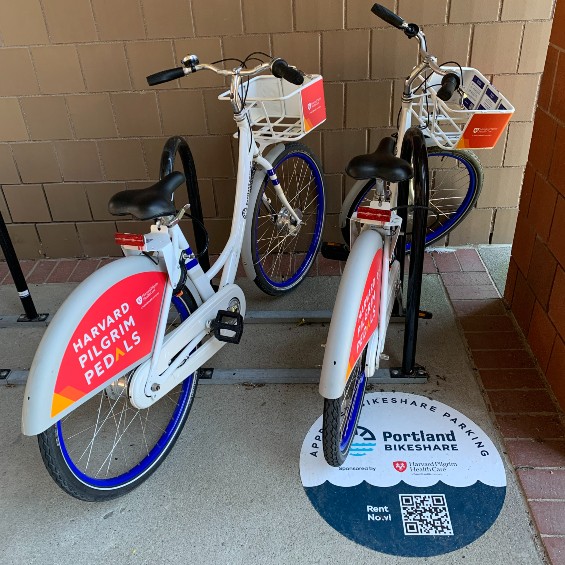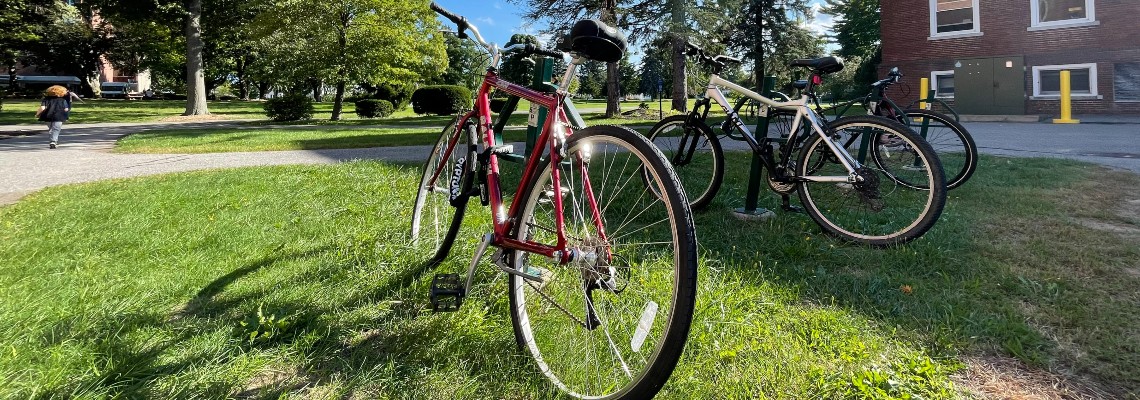Biking to campus can be a win-win-win, benefiting the environment, your health, and your wallet.
11% of USMers already walk or bike to the Portland campus and that number is growing each semester! If you want to save money, save carbon & get exercise, then all you need to do is put on a good pair of shoes, dress for the weather and plan a safe route. Check out these tools & maps to help you plan your journey:
The City of Portland, the Town of Gorham, and the City of Lewiston have each made efforts to increase bicycle usage. Portland has established bike lanes on many streets around the city, including bike lanes on Forest Avenue, Bedford Street, and Brighton Avenue surrounding the Portland campus. These lanes help you get to and from downtown from the Portland campus. The Town of Gorham recently completed a livable streets study, with public input, in order to implement safety measures to make the town more bicycle and pedestrian-friendly. The City of Lewiston has also taken on efforts to make the streets safer and provide trails.
After rolling into campus, USM provides bike racks next to most major buildings. And, 288 covered, secured long-term bike spaces are also available on the Portland campus to those who register their bikes.
All students should register their bike for free. See below for how to do this. This assists in the recovery of a lost or stolen bike and serves as a way of identification.
Lastly, don’t forget to join GoMaine, where you can log the miles you ride on your bike for points that are redeemable for tickets to drawings to win prizes. GoMaine also offers annual competitions.
Register Your Bike Here
All students, staff and faculty are encouraged to register their bikes, by filling out this form. It’s quick, easy and free. We recommend that you snap a pic of your bike and jot down your serial number before starting. This registration is mandatory for parking in indoor bike rooms, and optional for parking on outdoor racks. Students living in the residence halls on campus from Maine Law, SMCC and Unity are eligible to register. Although visitors can’t register, they can park for free on any available outdoor rack on campus.
Bike Policy
View the University’s bike policy here. All bikes on campus, and owners of those bikes, are subject to the policy. The policy includes details on bicycle parking, privileges and abandoned bike protocol.
Bikeshare
On the Portland campus, you have access to a bikeshare program, run by Tandem Mobility. This City-wide program features rentable electric bikes and manual bikes for a fee. Bikes are parked in front of Sullivan Gym and behind the outbound bus stop on Bedford Street. They may be taken anywhere in the City, but must be returned to a designated bikeshare parking station, as indicated on the map, or else the user will be charged extra fees by the vendor.

Taking the METRO?
If you ride the METRO bus to, from, or between campuses, and want to bring your bike, each METRO bus is equipped with three bike racks. Find out how to load your bike onto a METRO bike rack.
Bike Rack Locations
Bike rack locations are listed below. Bikes should not be attached to railings or trees; they should be attached to bike racks only.
Gorham:
- Phillippi Hall
- Dickey-Wood Hall
- Upperclass Hall
- Upton-Hastings Hall
- Robie Andrews Hall
- Costello Sports Complex
- Bailey Hall
- Corthell Hall
Portland:
- Sullivan Gym
- Science Building
- Payson Smith Hall (Side and Front Entrance)
- Maine Law Building (Multiple Bike Racks)
- Glickman Family Library
- Abromson Community Education Center
- Luther Bonney Hall
Lewiston:
- Outside South entrance
- Outside North entrance
Health Benefits
The health benefits of biking are numerous, including breathing fresh air, soaking in the sunlight, and getting exercise. In fact, biking just a couple of times a week can be an easy way to incorporate a workout into your busy schedule so that you don’t have to take so many trips to the gym.
Environmental Benefits
Greenhouse gas emissions from riding a bicycle compared to driving a single occupancy vehicle can be 10 times less, according to many studies. Every time you bike to USM, you are helping the University toward its goal of achieving carbon neutrality by 2040 by reducing greenhouse gas emissions from transportation by 20% by 2025. Additional environmental benefits include less creation of toxic storm-water run-off along roadways, which impacts ecosystems.


